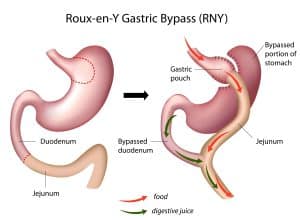Is Gastric Bypass Reversible?
Gastric bypass surgery is a well-known and effective procedure for significant weight loss, especially for individuals struggling with obesity and related health conditions. By surgically altering the digestive system, this procedure helps reduce the amount of food the body can consume and absorb, leading to substantial and sustained weight loss for many patients. While gastric bypass has transformed countless lives, empowering people to reclaim their health and confidence, questions often arise about the reversibility of this procedure.
In this comprehensive blog post, we will delve into the details of the gastric bypass surgery, including how it works and its potential benefits. We’ll also explore the complex topic of reversing this procedure, shedding light on the possibilities, considerations, and potential reasons why someone might opt for a reversal.
Gastric Bypass Procedure Explained

Gastric bypass, specifically the Roux-en-Y gastric bypass, involves creating a small pouch from the stomach and connecting it directly to the small intestine. This drastically reduces the stomach’s capacity, leading to reduced food intake and altered digestion, promoting weight loss. The procedure is typically performed laparoscopically, which involves making small incisions and using a camera to guide the surgery.
Steps in Gastric Bypass Surgery:
- Creation of a Small Stomach Pouch: The surgeon creates a small stomach pouch by separating a small section of the stomach from the rest, allowing it to hold much less food.
- Connecting to the Small Intestine: The surgeon then connects the small pouch directly to a portion of the small intestine, bypassing a significant part of the stomach and upper small intestine.
Can a Gastric Bypass Be Reversed?
Yes, gastric bypass surgery can be reversed, although it is a complex and rare procedure. Reversal involves reattaching the small stomach pouch back to the original stomach and reconnecting the intestines to their pre-surgery state. This requires advanced surgical skills and is usually considered only when medically necessary.
Reasons to Reverse Gastric Bypass
Several reasons can prompt patients to consider reversing a gastric bypass, though relatively rare. Here are some of the main reasons why patients undergo a gastric bypass reversal:
- Severe Hypoglycemia: Some patients develop intractable hypoglycemia, or very low blood sugar levels, which can pose a significant risk to their health, prompting them to undergo a reversal.
- Persistent Nausea and Vomiting: In some cases, chronic nausea and vomiting that does not respond to medical treatments and significantly affects patients’ quality of life lead them to undergo a reversal.
- Gastrointestinal Problems: Patients may undergo a RNY reversal for complications such as strictures, ulcers, or obstructions in the gastrointestinal tract that cannot resolve through less invasive procedures.
- Chronic Abdominal Pain: Chronic abdominal pain that patients cannot adequately explain or treat by other means leads them to consider undergoing a reversal.
- Psychological Reasons: In rare cases, psychological factors, such as an inability to cope with the drastic lifestyle changes required post-surgery, lead patients to decide to reverse the procedure.
- Weight Regain: Although not a primary reason, in some instances, patients may regain a significant amount of weight, prompting them to consider reversal alongside other treatments for obesity.
- Quality of Life: An overall decline in the quality of life that patients attribute directly to the surgery and its side effects may also lead them to undergo reversal as an option.
READ: 10 Things I Wish I Knew Before Gastric Sleeve And Gastric Bypass
Risks of Gastric Bypass Reversal
1. Nutritional Deficiencies
One of the major risks of reversing a gastric bypass is the potential for nutritional deficiencies. During the initial gastric bypass surgery, parts of the small intestine are bypassed, which can lead to decreased absorption of essential nutrients. After reversal, the digestive system may struggle to adapt to the restored anatomy, leading to malabsorption issues and deficiencies in vitamins, minerals, and other nutrients.
2. Dumping Syndrome
Dumping syndrome, which involves rapid gastric emptying and related symptoms like nausea, cramping, diarrhea, and dizziness, is a potential risk after gastric bypass reversal. This condition can occur when undigested food moves too quickly from the stomach into the small intestine, causing unpleasant and sometimes severe side effects.
3. Hernias and Bowel Obstructions
The reversal procedure can increase the risk of developing hernias or bowel obstructions. Hernias can occur when part of an organ or tissue protrudes through a weakened area in the muscle or surrounding tissue. Bowel obstructions, which block the normal movement of food and waste through the intestines, can also be a complication due to the altered anatomy and potential for adhesions or scar tissue formation.
4. Leaks and Bleeding
As with any major surgery, there is a risk of leaks from the reconnected areas of the digestive tract or internal bleeding. These complications can be life-threatening if not addressed promptly and may require additional surgical interventions or prolonged hospital stays.
5. Infection
Infections are a potential risk with any surgical procedure, including gastric bypass reversal. Infections can occur at the surgical site or internally, and if severe, may require antibiotic treatment or additional procedures to address.
6. Longer Recovery Time
The reversal procedure is typically more complex than the initial gastric bypass surgery, and recovery times can be longer. Patients may experience an extended period of discomfort, activity restrictions, and a prolonged return to normal eating habits and digestive function.
Conclusion
It’s important to note that the specific risks and complications can vary depending on the individual’s health status, the surgical approach used, and the experience of the surgical team. Discussing these risks thoroughly with a qualified bariatric surgeon is crucial before deciding to undergo a gastric bypass reversal.



